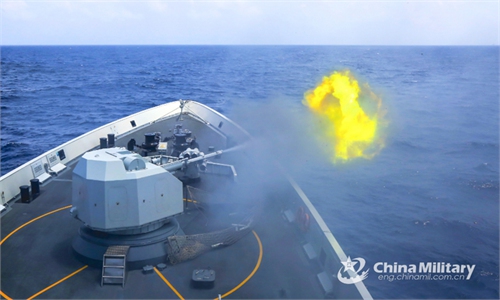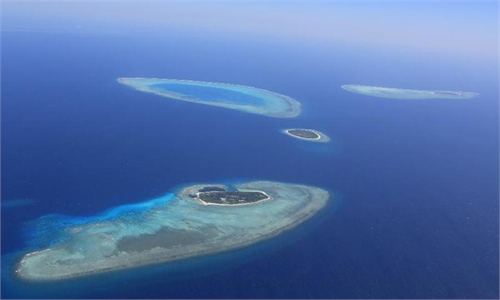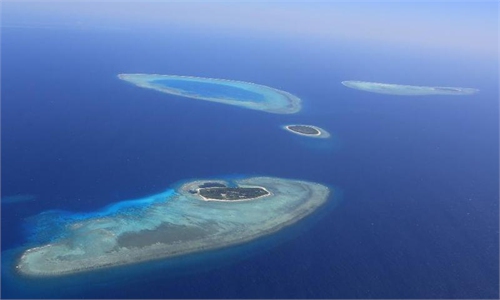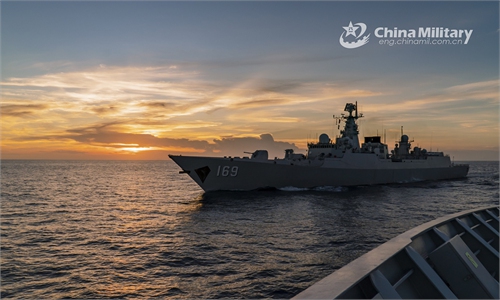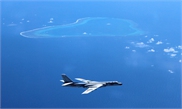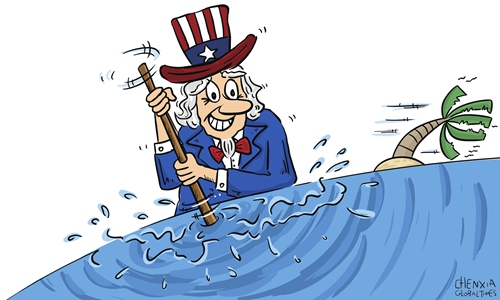
Illustration: Chen Xia/GT
Disputes in the South China Sea seem to have escalated recently. The US has frequently come to the region trying to demonstrate its military strength. On Sunday, Foreign Secretary of the Philippines Teodoro Locsin stated the country's tough claim regarding the South China Sea. US Secretary of State Mike Pompeo declared on Monday that "Beijing's claims to offshore resources across most of the South China Sea are completely unlawful."
The US has made tricky moves behind the scene regarding the South China Sea issue. At this time, it is necessary to strengthen crisis management and control mechanisms in the region to avoid strategic misjudgments among relevant parties.
To build complete and effective crisis management and control mechanisms in the South China Sea, the US must understand its own role. Washington must know that it is an outsider, rather than an insider here. The South China Sea issue should be discussed by relevant countries in the region, and the US should not try to spoil the situation.
The US has no justified reasons or legal basis to interfere in the South China Sea. The US is now putting dangerous and exaggerated labels on China, trying to intimidate relevant regional countries and make them turn to the US for military protection, which the US can use as excuses to justify its military presence and interference in the South China Sea.
Under the disguise of so-called freedom of navigation operations, the US has carried out various provocative activities in the South China Sea. This will lead to instability in the region. It may even trigger naval conflicts with other countries. By sending its aircraft carrier strike groups and bombers to operate in the South China Sea, the US has imposed military deterrents on regional countries, with veiled threats cast too. The US is now the biggest destroyer of peace and stability in the South China Sea.
Although the US will make some provocative actions in the South China Sea, it dares not go too far when facing the Chinese military. Under the existing China-US consultation mechanism that serves to strengthen military maritime safety, neither side should interfere with the other under normal conditions.
However, once US warships or military aircraft come too close to the islands and reefs in the South China Sea guarded by Chinese military forces, or enter sensitive waters or sensitive zones of airspace around these islands and reefs, China is justified to track, identify, and drive them away.
Noticeably, although tensions are running high between China and the US, it is unlikely that a serious military clash or a war will break out between them.
China needs to develop its military strength to make the US understand its policy and bottom line regarding the country's military security, so that the US can coordinate with the Chinese side to build the crisis management and control mechanism.
As for the islands and reefs guarded by Chinese military, China needs to enhance the protection of them. China also needs to strengthen its naval construction, especially with integrated sea-air operations in order to effectively consolidate its strategic defensive positions in the South China Sea. Only in this way can the US retreat from taking more provocative actions in the region.
It is a fact that China's military strength has improved rapidly in recent years. These upgrades are necessary because China is an important and stable factor for regional and global security. The Chinese navy is powerful, but instead of using its power to intimidate any country, China has brought benefits to more countries.
For example, China has sent its Type 920 hospital ship - also known as the Peace Ark - to offer medical assistance to many countries. China uses real actions to display its peace-loving attitude, strength and civilized manner. China also maintains regional peace and stability through multilateral dialogue mechanisms.
To strengthen crisis management and control mechanisms in the South China Sea, we need to guarantee the effectiveness of bilateral and multilateral communication channels in the region. If the US Navy tries to exclude China from multilateral consultation frameworks or takes a hostile approach toward China, the South China Sea may become even more insecure and unstable. Under such circumstances, the US will be the one to blame.
The author is a Beijing-based military analyst. opinion@globaltimes.com.cn
